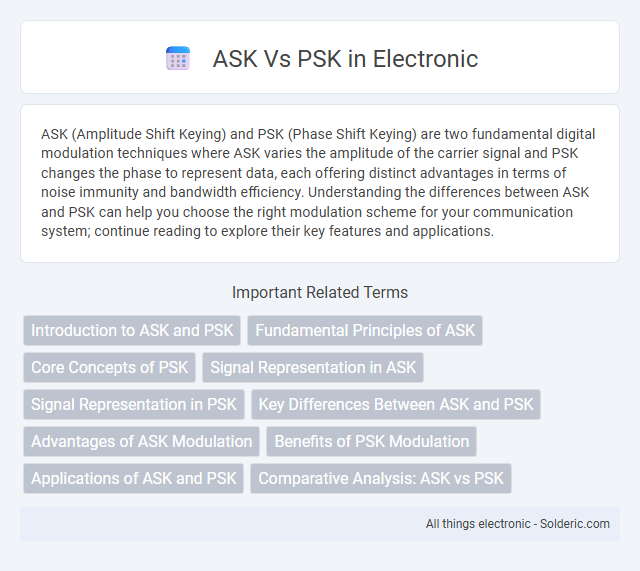ASK (Amplitude Shift Keying) and PSK (Phase Shift Keying) are two fundamental digital modulation techniques where ASK varies the amplitude of the carrier signal and PSK changes the phase to represent data, each offering distinct advantages in terms of noise immunity and bandwidth efficiency. Understanding the differences between ASK and PSK can help you choose the right modulation scheme for your communication system; continue reading to explore their key features and applications.
Comparison Table
| Feature | ASK (Amplitude Shift Keying) | PSK (Phase Shift Keying) |
|---|---|---|
| Modulation Type | Amplitude variation of carrier signal | Phase variation of carrier signal |
| Noise Sensitivity | High (affected by amplitude noise) | Lower (more resistant to amplitude noise) |
| Bandwidth Efficiency | Lower | Higher |
| Power Efficiency | Less efficient, power varies with amplitude | More power efficient, constant amplitude |
| Complexity | Simple transmitter and receiver design | More complex design due to phase detection |
| Applications | Low-speed data transmission, optical communication | Wireless communication, satellite systems, RFID |
| Bit Error Rate (BER) | Higher BER in noisy environments | Lower BER, better performance |
Introduction to ASK and PSK
Amplitude Shift Keying (ASK) modulates digital data by varying the amplitude of a carrier signal while maintaining constant frequency and phase, making it a straightforward technique for transmitting binary information. Phase Shift Keying (PSK) encodes data by changing the phase of the carrier wave, offering improved noise resistance and spectral efficiency compared to ASK. Both methods serve as foundational modulation schemes used in digital communication systems for reliable data transmission.
Fundamental Principles of ASK
Amplitude Shift Keying (ASK) modulates the carrier signal's amplitude to represent binary data, assigning distinct amplitude levels to binary digits 0 and 1. The fundamental principle of ASK involves varying signal intensity while maintaining constant frequency and phase, making it a simple yet effective digital modulation technique. Your communication system's performance with ASK depends on signal amplitude separation and noise resilience.
Core Concepts of PSK
Phase Shift Keying (PSK) modulates the phase of a carrier signal to represent digital data, differentiating it from Amplitude Shift Keying (ASK), which varies amplitude. PSK encodes information by shifting the carrier phase among discrete angles, such as 0deg, 90deg, 180deg, or 270deg, corresponding to different symbol values in schemes like BPSK, QPSK, and 8-PSK. This phase-based modulation offers improved noise immunity and spectral efficiency compared to ASK, making PSK preferable in wireless communication systems.
Signal Representation in ASK
Amplitude Shift Keying (ASK) represents digital data through variations in the amplitude of a carrier wave, where a binary '1' corresponds to a higher amplitude and a binary '0' corresponds to a lower amplitude or zero amplitude signal. This modulation technique allows easy implementation but is more susceptible to noise and signal degradation compared to Phase Shift Keying (PSK). Your communication system's signal representation in ASK involves distinct amplitude levels, making it crucial to maintain signal integrity for effective data transmission.
Signal Representation in PSK
Phase Shift Keying (PSK) represents data by modulating the phase of a constant amplitude carrier signal, encoding information through discrete phase shifts such as 0deg, 90deg, 180deg, and 270deg in Quadrature PSK (QPSK). Unlike Amplitude Shift Keying (ASK), which varies signal amplitude to denote binary data, PSK maintains a constant amplitude, reducing amplitude distortion and improving noise resistance in communication channels. The signal representation in PSK is mathematically expressed as s(t) = A cos(2pf_ct + th), where th denotes the phase shift corresponding to specific symbol values.
Key Differences Between ASK and PSK
ASK (Amplitude Shift Keying) and PSK (Phase Shift Keying) differ primarily in how they encode data onto a carrier signal; ASK varies the amplitude, while PSK varies the phase. ASK is more susceptible to noise and signal degradation, making it less reliable in environments with interference compared to PSK, which offers better noise immunity and higher data integrity. Your choice between ASK and PSK depends on the communication system's requirements for robustness, bandwidth efficiency, and complexity.
Advantages of ASK Modulation
ASK modulation offers simplicity in implementation and requires less bandwidth compared to PSK, making it efficient for applications with limited resources. Its ease of demodulation allows for cost-effective receiver designs, ideal for low-power and short-distance communications. Your system benefits from ASK's straightforward signal processing, enabling faster data transmission in noise-tolerant environments.
Benefits of PSK Modulation
PSK modulation offers improved noise immunity and higher spectral efficiency compared to ASK, making it ideal for reliable digital communication in noisy environments. PSK's phase changes make it less susceptible to amplitude variations and signal fading, enhancing signal integrity over long distances. This robustness allows PSK to support higher data rates and more complex modulation schemes, optimizing bandwidth utilization and overall system performance.
Applications of ASK and PSK
Amplitude Shift Keying (ASK) is widely used in low-cost and low-bandwidth applications such as RFID systems, optical fiber communication, and simple digital communication systems where noise levels are relatively low. Phase Shift Keying (PSK) is preferred in wireless communication systems like Wi-Fi, Bluetooth, and cellular networks due to its robustness against noise and interference, making it suitable for high-speed data transmission. PSK's applications extend to satellite communication, deep-space communication, and secure data encryption protocols, leveraging its efficient bandwidth utilization and error performance.
Comparative Analysis: ASK vs PSK
Amplitude Shift Keying (ASK) transmits data by varying the amplitude of the carrier signal, making it more susceptible to noise and amplitude distortion compared to Phase Shift Keying (PSK), which modulates data through changes in the carrier signal's phase. PSK offers higher noise immunity and better spectral efficiency, leading to improved performance in bandwidth-limited and high-interference environments. The selection between ASK and PSK depends on system requirements such as power efficiency, error rates, and channel conditions, with PSK generally favored in digital communication systems for its robustness and reliability.
ASK vs PSK Infographic

 solderic.com
solderic.com